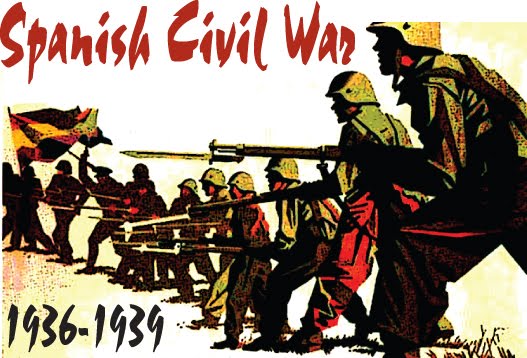The Spanish Civil War 1936 - 39
Background to the war
In the 1930s, Spain was a deeply divided country that was politically torn between right-wing Nationalist and left-wing Republican parties. The Nationalist party was made up of monarchists, landowners, employers, the Roman Catholic Church and the army. The Republicans consisted of the workers, the trade unions, socialists and peasants.Economically, the country had been deeply hit by the Great Depression after the Wall Street Crash. Partly due to this turmoil, in 1929 the military dictatorship that had ruled Spain since 1923 collapsed. In 1931 the King abdicated after the Republicans came to power.
There followed a period where the two political rivals had periods in power as the elected government. The country was so divided and unstable that in 1936 the army rebelled and forcibly removed the Republicans from power. Civil war ensued.
The importance of Spain in Europe
If Spain fell to the Nationalists, France would be surrounded by Fascist powers (Germany and Italy). If France was invaded by Fascist nations, the alliances between other anti-Fascist nations would be weakened. In effect, there would be one less nation to resist Fascist plans to expand their borders - one less army to stand up to them.Spain also had strategic naval bases on the Mediterranean Sea and Atlantic Ocean that could be used by the Fascists to control shipping and for setting up submarine bases. These could be used to put military and economic pressure on other European nations.
International intervention
The Fascist powers
Hitler and Mussolini (Italy's Fascist leader) both sent thousands of troops and weapons to Spain to aid the Nationalist forces. They both had similar aims and a common desire to see Spain fall to the right-wing Nationalists.As Fascist allies, it was in both Germany's and Italy's interest to fight the spread of Communism. They did not want Spain, a near neighbour to both nations, to become a Soviet-backed stronghold. Indeed, the opposite was true. If Spain came under right-wing control it could be an important ally to the two countries in any future conflict.
Furthermore, if yet another major European nation were to adopt the Fascist creed, it would send a message to the whole world that the Fascists were a power to be reckoned with.
The Democracies
France and Britain were both in an awkward situation regarding Spain. They did not want the nation to fall to the Nationalists, as this would strengthen the power of the Fascist alliance of Germany and Italy. Equally, though, they would be no better off if Spain fell to the Soviet-backed Republicans, as Communism was seen as a huge threat to world peace.The French and British agreed a mutual policy and set up a Non-Intervention Committee that effectively blocked international aid reaching Spain. They could not, however, stop Germany and Italy sending forces and supplies to the Nationalists. The result of this was that the Republicans had to rely solely on the dubious charity and benevolence of Stalin's Russia.
The Soviet Union
The USSR sent weapons and supplies to aid the Republicans in their struggle against the forces of Fascism, but it was never as committed to the conflict as either Germany or Italy. The Russian leader, Stalin, sold only enough supplies to the Republicans to keep them fighting. Stalin was content that Germany was being kept busy with Spain rather than concentrating its efforts in eastern Europe.The International Brigades
The fight against Fascism drew young men and women from all over Europe and the USA to Spain. Fighting for the Republicans, these idealists, socialists and communists, formed a rag-tag army determined to uphold democracy against the right-wing threat. At any one time up to 15,000 people were fighting in the International Brigades.The results
- The better organised and better equipped Nationalist forces won the war after Madrid was captured in March 1939.
- Hitler's position in Europe was now strengthened since he had another potential ally in the right-wing dictator of Spain, General Franco.
- Participation and co-operation in the Spanish war strengthened the bond between Italy and Germany. As a result, the Rome-Berlin Axis was formed. Italy and Germany were now firm allies.
- By ignoring the Non-Intervention Committee and its chief architects, France and Britain, Hitler had shown his strength in European affairs.
.jpg)